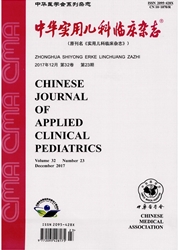

 中文摘要:
中文摘要:
目的分析胎粪吸入综合征(MAS)新生儿的临床资料,为早期发现重症MAS及预防并发症提供依据。方法对四川大学华西第二医院新生儿科2006年12月至2011年12月收治的107例确诊为MAS新生儿的临床资料进行回顾性分析。根据是否需要呼吸机辅助通气(包括采用持续呼吸道正压通气及有创通气)分为重症MAS组(52例)、非重症MAS组(55例),采用SPSS15.0软件进行统计分析,比较2组患儿一般情况、母儿孕期健康状况及并发症。结果2组患儿在出生1min、5min、10minApgar评分,胎儿宫内窘迫,出生时气管插管吸取胎粪之间的差异均有统计学意义。并发症中以缺氧缺血性脑病(HIE)(61.7%)、心肌损伤(43.0%)、代谢紊乱(41.1%)和颅内出血(20.6%)最常见。重症MAS组患儿中,HIE、代谢紊乱、DIC、颅内出血、肺出血、心肌损伤、肾功能损伤等并发症发生率均高于非重症MAS组,尚未发现重症MAS与母亲孕期并发症、生产方式如剖宫产等相关。结论重症MAS发生与胎儿宫内窘迫、出生时窒息相关。MAS尤其是重症MAS易合并多器官系统损伤,应加强监测。
 英文摘要:
英文摘要:
Objective To provide the clinical evidence for early diagnosis of meconium aspiration syndrome (MAS) and to prevent its complications. Methods One hundred and seven eases of neonates diagnosed with MAS treated in Department of Neonatology, West China Second Hospital, Sichuan University, from Dec. 2006 to Dec. 2011 were analyzed retrospectively. They were assigned into severe MAS group(52 cases) and non-severe MAS group(55 ca- ses) according to whether need mechanical ventilation( including positive end-expiratory pressure and invasive ventila- tion). Comparisons were carried out with SPSS 15.0, including the general situation of the newboms, obstetric charac- teristics and complications of both groups. Results There were significant differences in 1 min,5 min and 10 min Ap- gar score, intrauterine distress, endotracheal intubation meconium suction between the 2 groups. The common complica- tions of M AS were hypoxic-ischemie encephalopathy(HIE) (61.7%), myocardium injury( 43.0% ), metabolism disor- der (41.1% ) and intracranial hemorrhage (20.6%). The incidences of HIE, metabolism disorder, disseminated intra- vascular coagulation, intracranial hemorrhage, pulmonary hemorrhage, myoeardium injury and kidney injury in severe MAS group were significantly higher than those in non-severe MAS group. However, no in crease of the prevalence of se- vere MAS was proved because of clinical conditions, such as maternal pregnancy complications and cesarean section. Conduslons Intrauterine distress and asphyxia are associated with increased the risk of severe MAS. MAS,especially severe one, can lead to multiple organ dysfunction, so it deserves much closer caring and monitoring.
 同期刊论文项目
同期刊论文项目
 同项目期刊论文
同项目期刊论文
 Targeting Hypoxia Inducible Factor-1 alpha: A Novel Mechanism of Ginsenoside Rg1 for Brain Repair af
Targeting Hypoxia Inducible Factor-1 alpha: A Novel Mechanism of Ginsenoside Rg1 for Brain Repair af In Vitro Effects of Hypoxia-Inducible Factor 1 alpha on the Biological Characteristics of the SiHa U
In Vitro Effects of Hypoxia-Inducible Factor 1 alpha on the Biological Characteristics of the SiHa U Signaling pathway involved in hypoxia-inducible factor-1 alpha regulation in hypoxic-ischemic cortic
Signaling pathway involved in hypoxia-inducible factor-1 alpha regulation in hypoxic-ischemic cortic Influence of hypoxia-inducible factor 1-alpha on neuronal apoptosis in a rat model of hypoxia- or hy
Influence of hypoxia-inducible factor 1-alpha on neuronal apoptosis in a rat model of hypoxia- or hy 期刊信息
期刊信息
